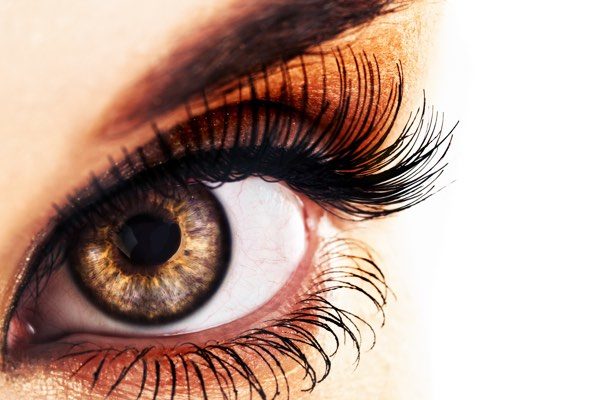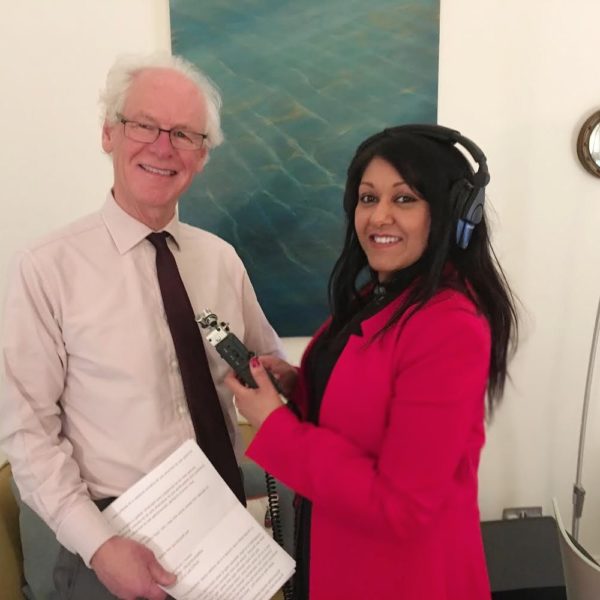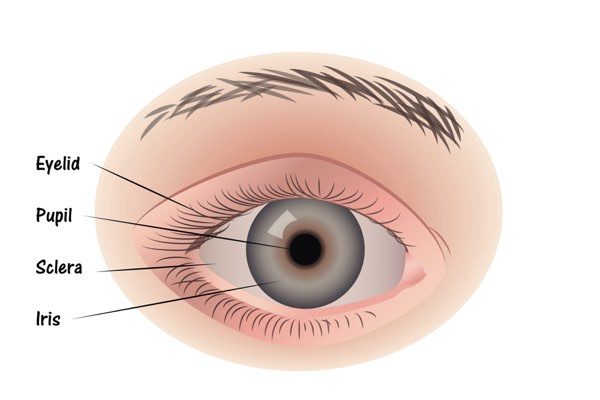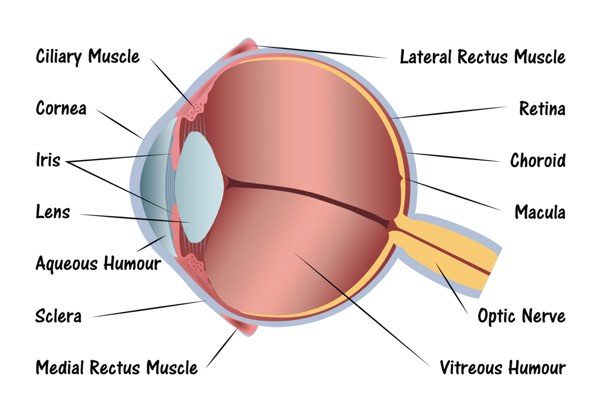Jana’s Studio : I Spy With My Little Eye – A Look into our Eyes

Hello, and welcome to Jana’s Studio, Storynory’s new and exciting programme, where we talk to fascinating people about fascinating things.
In this episode, we are looking into your eyes. The brain is the most complicated part of your body, but the eyes are the second most complex organs, and the eyes and the brain are closely connected. For instance, your eyes actually see the world upside down, and your brain turns it the right way around for you. Yes, those two little sparkly orbs are the windows into your soul, and your windows onto the world. Joining me now to help us learn more about your eyes is Paul Kinnear, who is a consultant ophthalmologist, which means he is a senior doctor who specialises in eyes. He works at the BUPA Cromwell Hospital in London.

Mr Paul Kinnear FRCS FRCOphth
The music (chosen by Paul) is Bach, Partita in B-flat major, played by Chiara Bertoglio ( copyright Creative Commons Attribution 3.0 )
Jana - Hi Paul, thank you for joining me today.
Paul - Hi and hi to all the Storynory listeners. I'm very pleased to be here.
Jana - Paul, to begin with, can I ask you what made you decide to specialise in eyes?

Paul - Well I was inspired when I was at the medical school, the Westminster Medical School, by quite a famous eye surgeon called Patrick Trevor Roper. And in his lectures he gave wonderful examples of eye conditions and showed a film actually, which had the background music of a Bach cello suite which I think also inspired me. And then I just loved the precision and detail of the eye and operating on under a microscope on eye conditions. And also the fact that the eyes are a sort of window for a lot of eye conditions, like diabetes. You look into the eye and you can see the effects of diabetes inside the eye itself.
Jana - Mmm thank you. So could you tell me the most common eye problems that you find in children in your practice?
Paul - Well, a lot of the children I see have got refractive error i.e. they're short sighted or they have an astigmatism and they need to wear glasses, otherwise they can develop what's called a lazy eye, where even though you have glasses, later in life the vision is still not as good as it could be. And other children have conditions like strabismus. Their eye could go in or out or even up. And also I see quite a lot of children in the springtime with allergic conjunctivitis. That's quite a common problem as well.

Jana - So what prompts Mums and Dads to come in, in the first place with their children's eye conditions?
Paul - Well the commonest thing is when they think the eye is not straight, like a squint and so it looks as though the eye is either turning in or out. In fact it's quite common in young babies to have the appearance of a squint which is called a pseudo squint. So a lot of children are bought in, in sort of infancy to have their eyes checked. And then subsequently if there's a family history of short sight for example then often parents will bring their child in to check whether they've developed a similar condition as they have. And obviously if the eyes are red or itchy from an allergy, then that's a good reason for bringing your child in if they're complaining about headaches for example or red eye or sticky eye. So those are the sort of things that prompt parents to come to see me with their children.
Jana - The world over, about 253 million people are either blind or have serious loss of sight - could most of those eye problems be cured or prevented?
Paul - Certainly a significant proportion of those cases could be. If you take the example of cataract, which many many hundreds of thousands of people are blind from, they could be dealt with by a relatively simple operation. And their vision could be restored. And if you take the example of infections, e.g. there's a condition called trachoma, which causes scarring and eventual blindness, this could be treated with applying a simple antibiotic ointment in childhood to prevent the infection taking hold that's causing the scarring.
Jana - Paul, can you explain what a cataract is?
Paul - Well a cataract is when the lens of the eye that focuses becomes progressively cloudy and it's particularly induced by sunlight, so often a lot of people are working out in the fields for example are more prone to cataract. Very interesting in Nepal for example, where I worked for the WHO, most of the blindness from cataract was in the women who were sent out to work in the fields, where as the men stayed indoors playing games and relaxing. So it was a definite difference in exposure to light being outdoors. And that could be prevented in fact, even by just the workers wearing large hats to protect their eyes from the sun.
Jana - Ah that's very interesting.
So why are some people short sighted or long sighted? I know I seem to have developed some long sightedness in the last few years and these days I seem to need a longer arm.
Paul - Well I mean, essentially short sighted and long sighted are in genetics, so if both your parents are very short sighted then it's likely that you'll become short sighted as well. I mean what you're describing about longer arms is something that affects people when they get to their sort of 40’s or 50’s when the lens of the eye isn't able to focus quite so readily, so you eventually need to have glasses to help you read.
Jana - Does the colour of your eyes make any difference to how we see?
Paul - Not specifically, I mean I think that people with blue eyes are a little bit more light sensitive, but their vision is as good as anybody's with brown eyes. But the only difference of course is for albinos who have pink eyes and they do have quite reduced vision.
Jana - Yes. A lot of parents are worried that kids spend too much time looking at screens, phones and iPads and so forth. Is modern technology making our sight worse?
Paul - No, there's no real evidence that that's the case, although people who spend a long time looking at screens can develop short sightedness when they may otherwise not have done. The most important thing is to spend time outdoors and that seems to be a factor for preventing children developing short sightedness. It's not specifically a factor of looking at screens. It's the fact of being outside in sunlight, that's important.
Jana - Well there's a good tip for you kids.. outdoors!
So what are your top tips for keeping our eyes healthy?
Paul - Well, eat well, good diet. Leafy green vegetables are important. And very important not to smoke cigarettes and also to avoid a lot of UV exposure, so dark glasses are very important when it's bright and sunny.
Jana - So out of sunlight, ok.
And finally, Paul. We’ve been talking about human eyes, but I just wondered if all animals have the same sort of eyes?
Paul - Well in principle they function in the same way with light being focused on to a retinal layer but there are significant differences for e.g. The giant squid has in fact the largest eye which is something like the size of a dinner plate or a soccer ball 10 inches. And they a system which is focusing that's different. It works rather like a camera, so the lens of the squid eye moves back and forwards as opposed to our human lens which gets fatter or thinner to focus for us.
Jana - That is absolutely amazing information. I'm sure the kids would love to know that. So Paul, just on a lighter note, do you know any good jokes about eyes?
Paul - What do you call a deer with no eye?
Jana - I don't know. What do you call a deer with no eye?
Paul - No idea!
Jana - That's nice. Any more?
Paul - Well there's another one I've got for you up my sleeve.
What do you call a fish without an eye?
Jana - I don't know. What do you call a fish without an eye?
Paul - Fsh!
Jana - Thank you Paul, very insightful.
Paul - Excellent, my pleasure.
Jana - And Paul, just before you go, is there a poem about eyes that you'd like to suggest for Richard to read?
Paul - Well yes there is. There's a rather fine but rather short poem called ‘The Night has a Thousand Eyes’, by a 19th Century, English poet - Francis William Bourdillon, which I think would be perfect.
Jana - Well that's wonderful. Thank you very much Paul.
Richard, over to you!
“The night has a thousand eyes,
And the day but one;
Yet the light of the bright world dies
With the dying sun.
The mind has a thousand eyes,
And the heart but one:
Yet the light of a whole life dies
When love is done.”
Francis William Bourdillon.
Jana - Ah thank you so much, Richard!
And I'd like to thank Paul Kinnear for joining me today and for his professional and interesting insights.
It is undeniable that our eyes are a precious part of us, and unique to every individual. It has been said that our eyes are ‘windows to the soul,’ and can provide others with information about how we’re feeling. However, you may not realise exactly how much they’re giving away!
We only have one pair, so do look after them.
For now from me, Jana at Storynory.com, take care of yourselves.
And please don't forget, if you'd like to support us on Patreon, our link is on the website. As ever your support is incredibly valuable to us.